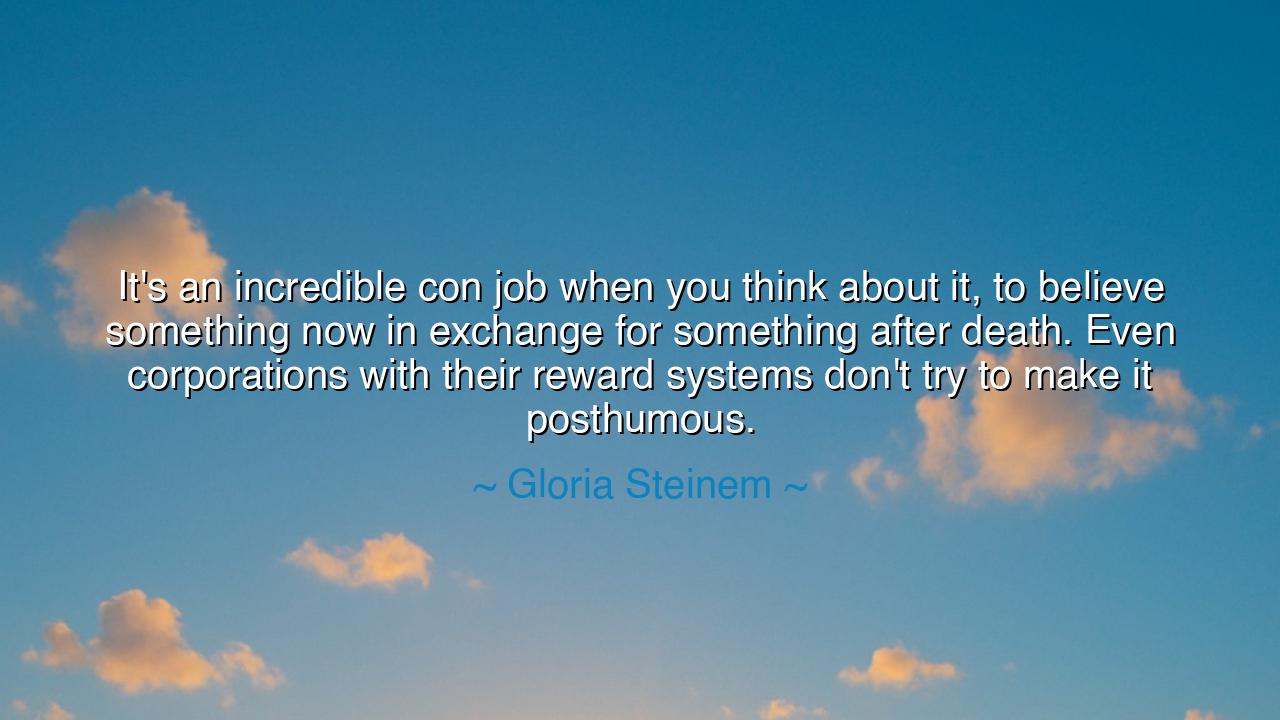
It's an incredible con job when you think about it, to believe
It's an incredible con job when you think about it, to believe something now in exchange for something after death. Even corporations with their reward systems don't try to make it posthumous.






In the fearless and unyielding words of Gloria Steinem, one of the great voices of liberation and truth, there resounds a challenge to the very foundations of blind faith and submission: “It’s an incredible con job when you think about it, to believe something now in exchange for something after death. Even corporations, with their reward systems, don’t try to make it posthumous.” These words are not spoken in mockery of belief, but in defense of the living spirit — a cry for freedom from those who would trade the joy of life for the illusion of reward beyond the grave. Steinem, ever the champion of reason and justice, unmasks in this statement the long history of control through fear, the manipulation of human hope by powers that thrive on obedience rather than understanding.
The origin of this quote arises from Steinem’s lifelong struggle against the structures that have kept humanity — especially women — bound by invisible chains. As a leading figure in the feminist movement of the twentieth century, she saw how religion, tradition, and authority often conspired to subdue the individual spirit. Promises of heavenly reward and threats of eternal punishment were used to silence rebellion, to justify suffering, and to discourage the pursuit of justice in the present world. By calling such a system a “con job,” Steinem exposes the ancient bargain that countless generations have accepted: obedience now, paradise later; pain now, peace later; silence now, salvation later. Her words remind us that any truth that demands we die before we can live is no truth at all.
Throughout history, the powerful have often wielded the promise of afterlife rewards to maintain their rule. The pharaohs of Egypt commanded armies of slaves to build tombs that would ensure their passage into eternity. The medieval lords and kings cloaked their exploitation of the poor in divine language, telling peasants that their suffering would be redeemed in heaven. Even in modern times, ideologies—religious and secular alike—have demanded the sacrifice of the present for the glory of some imagined future. Yet, as Steinem points out, even the cold machinery of corporations does not make such a demand. They at least offer wages in life, not promises after death. What greater irony, then, that humanity has so often submitted its freedom to those who offer payment in a currency that cannot be proven to exist?
Consider the story of Giordano Bruno, the philosopher of the Renaissance who dared to speak of infinite worlds and a boundless universe. For his courage to think beyond the dogma of his time, he was condemned and burned at the stake by the Church in 1600. His executioners told him his suffering would cleanse his soul; he replied, “You may be more afraid to deliver this sentence than I am to receive it.” Bruno refused to surrender the truth of his present life for the comfort of an afterlife dictated by others. His martyrdom is not one of faith, but of freedom—a refusal to let others define the meaning of existence through promises that cannot be seen.
Steinem’s words do not call for cynicism but for awakening. She urges us to claim our right to live now—to seek justice, love, and fulfillment in this life, not to defer them endlessly in the hope of divine compensation. To believe something now in exchange for something after death is, she warns, to surrender the only certainty we have: the beating of our hearts, the breath in our lungs, the chance to act while time still allows it. It is to let others dictate our purpose and to let fear disguise itself as faith. True belief, she implies, should inspire life, not deny it.
The ancients understood the danger of postponing meaning. The Stoics taught that death is inevitable, but it should make us live more fiercely, not more fearfully. Marcus Aurelius, the philosopher-emperor, wrote, “Do not act as if you were going to live ten thousand years. Death hangs over you. While you live, while it is in your power, be good.” The message is the same: to live with integrity and courage now, not for the hope of a future world, but because this one deserves our fullest devotion. Steinem’s modern defiance is but an echo of that ancient wisdom — that no greater sacrilege exists than to waste the miracle of life on waiting for another.
So, my child of tomorrow, let this be your lesson: do not trade your present for promises unseen. Do not let anyone convince you that goodness must be rewarded later to be real now. Build your heaven here, with your deeds, your compassion, your courage. Create a world where disease is healed, where justice is done, where freedom breathes freely — not because you are promised paradise, but because life itself is sacred enough to demand it.
For as Gloria Steinem teaches, the greatest deception is to live as if salvation lies beyond the grave. The truth is simpler and far more radiant: the divine is not in waiting but in doing; not in hoping for reward, but in creating meaning with your own hands. So live with fire, love with purpose, and build a world worthy of the life you’ve been given — a world where belief serves life, not the other way around.






AAdministratorAdministrator
Welcome, honored guests. Please leave a comment, we will respond soon